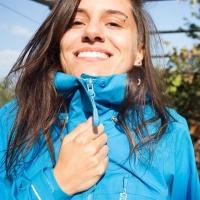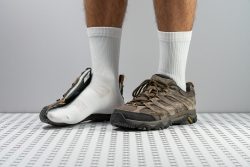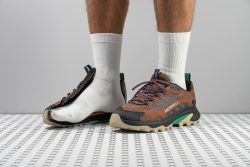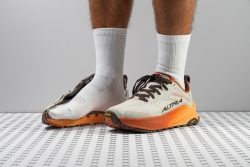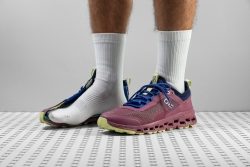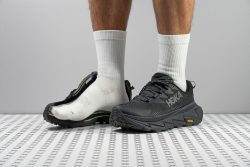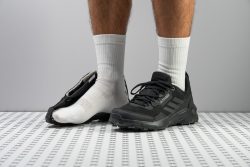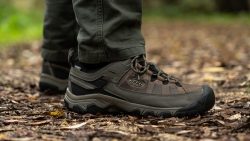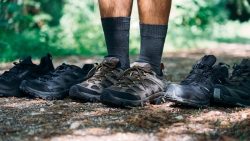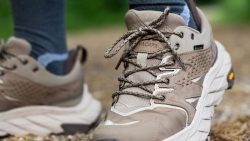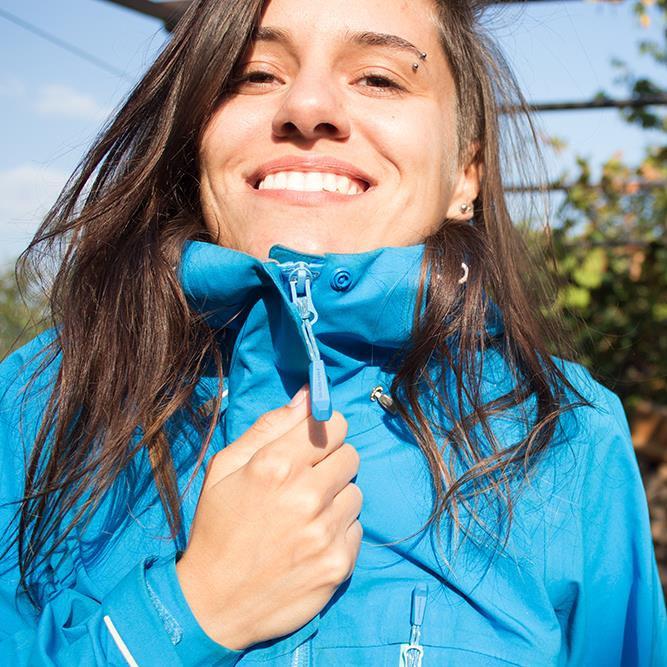6 Best Summer Hiking Shoes in 2025
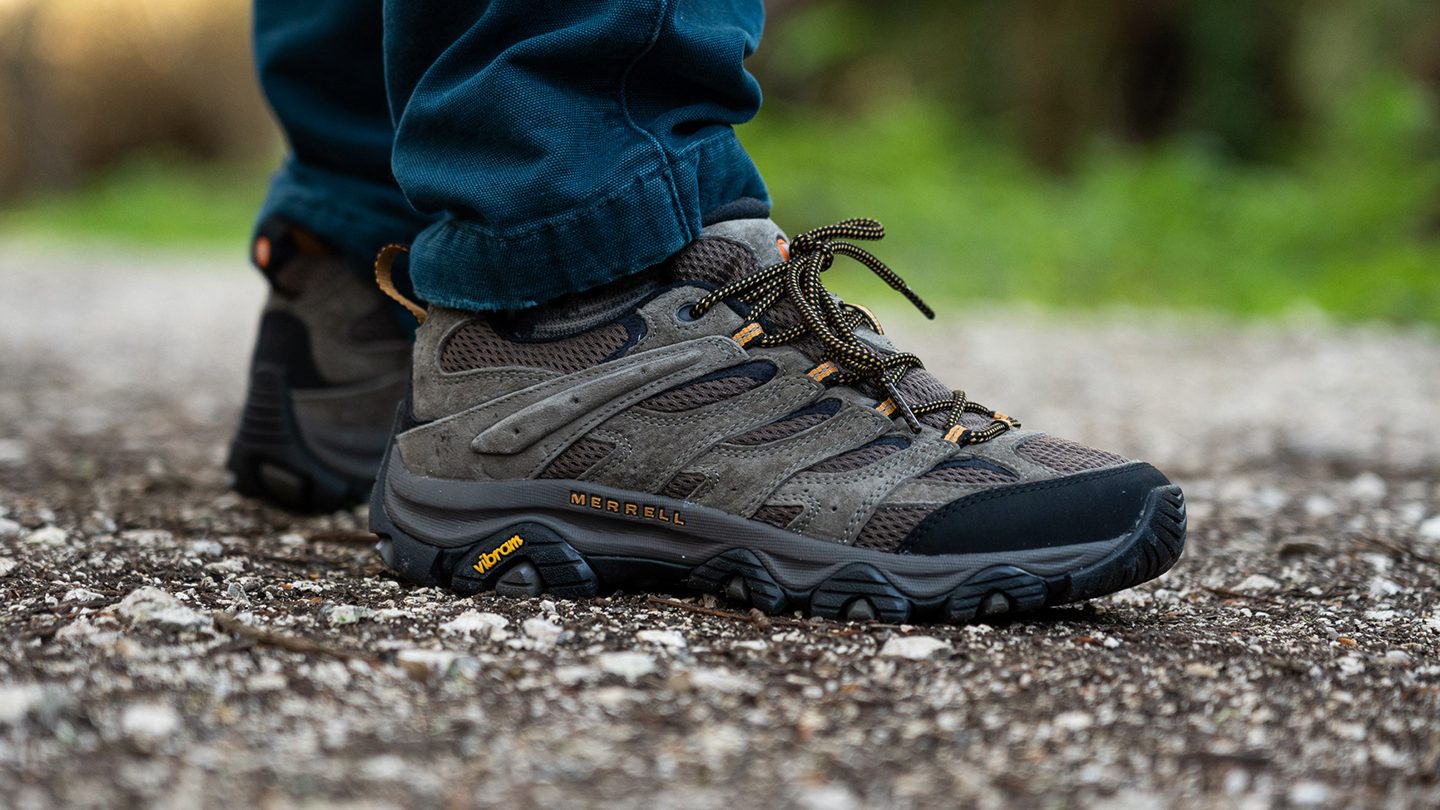
We buy shoes ourselves. We earn commissions when you buy through us, at no extra cost. Why trust us
Are you looking forward to busting some trails this coming summer season? If so, don’t settle for anything less — be in the best summer hiking shoes possible.
We went over with a fine-tooth comb in testing each of these summer shoes. We hiked in them and we tested their breathability in the lab. Yes, we pumped smoke into them and looked at the upper under the microscope! Rest assured, listed here are t h e b e s t summer hiking shoes.
How we test summer hiking shoes
Here is what we do to select the summer hiking shoe top picks:
- We purchase summer hiking shoes with our own money.
- We wear these breezy hikers during the summer months to gauge their truest potential.
- We test these shoes in our lab. To focus on breathability, we test it by pumping the smoke into the shoe and observing where the smoke comes out and how quickly. We then cut the shoe in half, check the upper against the flashlight, and put it under our microscope. This way, we can comment on how loose or tight the threads are and if there are any ventilation holes.
Best summer hiking shoes overall
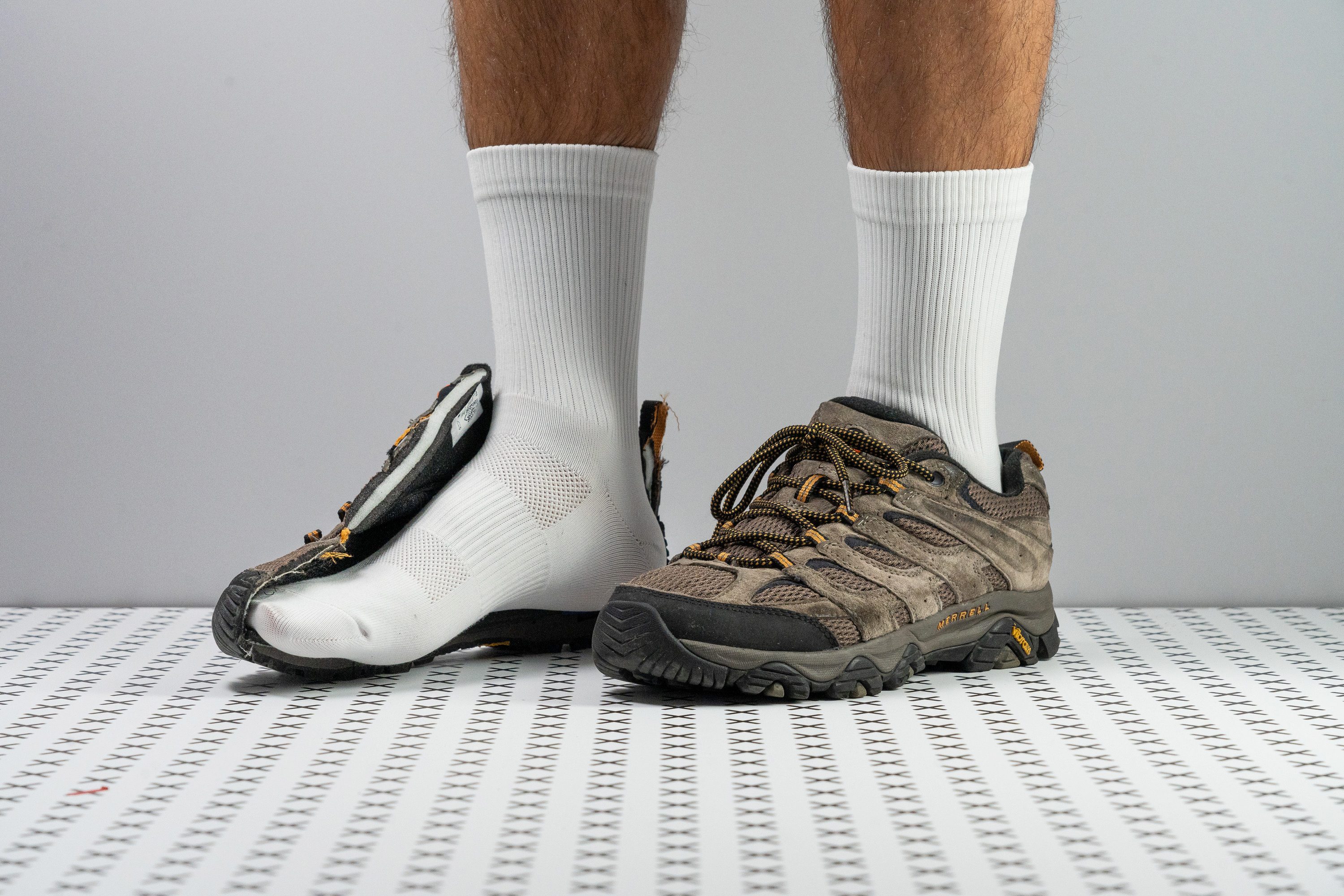


































What makes it the best?
Based on our lab analysis and test hikes, we have come to the conclusion that the Merrel Moab 3 is the best overall summer hiking shoe. Don’t be deceived by its workhorse appearance; this shoe was extraordinarily comfortable from day one. It kept our feet cool on hot summer hikes with excellent breathability and its flexible midsole allows our foot to flex naturally over uneven surfaces, improving its already stellar grip. What’s not to like?!
We were mightily impressed by the shoe’s ability to breathe and keep our feet sweat-free on hot days. We took a closer look at the shoe’s upper and saw that the tightly-woven mesh has plenty of ventilation pores. We found this great for drainage when we encountered damp conditions. To double-check our observations, we pumped smoke into the shoe to see how much made it through the pores. No surprises there - the smoke passed quickly and easily through the upper, so we awarded it 4/5 (5 is the most breathable).
The Moab 3 is a star for comfort. With its 14.5 mm-thick padded tongue (2 mm thicker than average) and extra padding around the heel, we needed no wear-in time. We noticed how nimble the shoe feels on our test hikes, so we brought them into the lab to crunch the numbers. We bent them to 30°, which measured an impressive 12.9N. Since the average is 18.3N, we know that this is a seriously flexible shoe!
On the other hand, we don’t recommend this shoe to hikers looking for something lightweight to cover a lot of ground quickly. At 16.2 oz (460g) the Merrell Moab 3 is 0.7 oz 20g heavier than average.
Pros
- Supremely comfy
- Zero break-in
- Boss-level support
- Solid grip on mixed terrain
- Stable platform
- Responsive cushioning
- Fits various foot shapes
- Cheaper than average
- Recycled materials
Cons
- Heavier than average
- Not quite sleek-looking
Summer hiking shoes with the best shock absorption
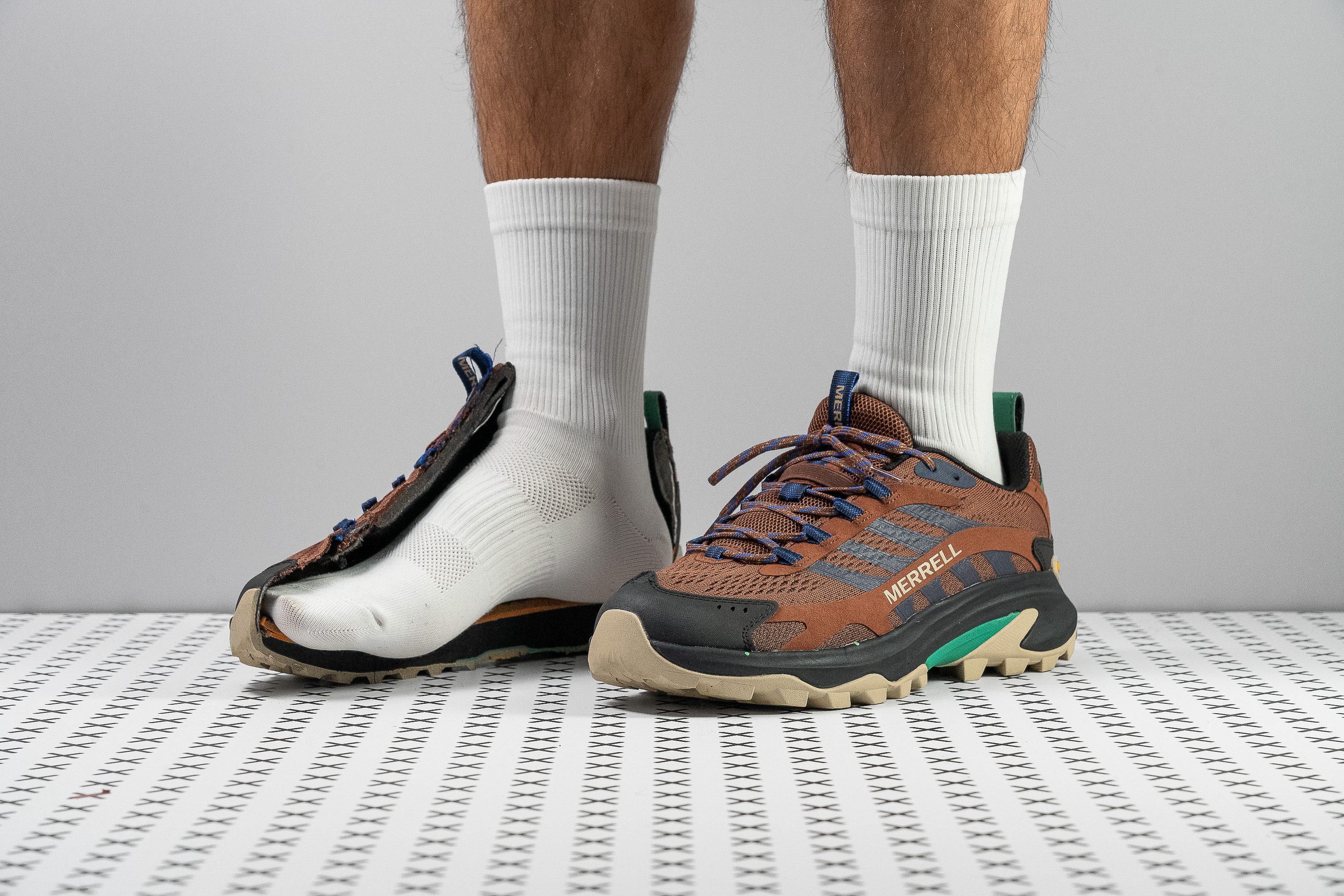






















































What makes it the best?
Among the summer hiking shoes we've tested, Merrell’s Moab Speed 2 offers the best shock absorption. This agile hiker provides all-day comfort with its plush cushioning, breathable upper, and reliable traction, allowing us to tackle any trail confidently. Versatile enough for high-speed and leisurely hikes, it's the perfect companion for summer adventures.
The Moab Speed 2 offers impressive arch support and a very generous 38.8 mm heel. More than its height, it offers deep and lasting comfort with its outstanding 125 SA score when we tested for its impact protection. No matter how long our hikes last, our feet feel at home.
Despite its thick cushioning, it never weighed us down. At a mere 11.6 oz (329g), it’s one of the lightest we’ve tested, far from the 13.4 oz (380g) average hiker. Its build allows us to move through trails at a faster pace since it's easier to control and requires less effort when climbing. Adding to its lightness is the breezy mesh upper that scored a high 4/5 breathability in our lab’s smoke test.
The Vibram TC5+ outsole, lined with 3.7 mm lugs, grips onto moderate terrains effectively, ensuring every landing is safe and sound. Further boosting our stability is the FlexPlate, which adds lateral stiffness underfoot to help conserve our energy and balance.
A tiny pet peeve is how small rocks can enter through the semi-gusseted tongue. Those who find this a hassle can explore alternatives.
Pros
- One of the lightest hiking shoes
- Plush and abundant cushioning
- Great support and stability
- Perfect grip for moderate terrain
- Excellent durability
- Breathable for summer
- Cozy step-in feel
- Two loops for easy on-off
Cons
- Frail inner lining
- Small debris gets inside
Best summer hiking shoes with a wide toebox
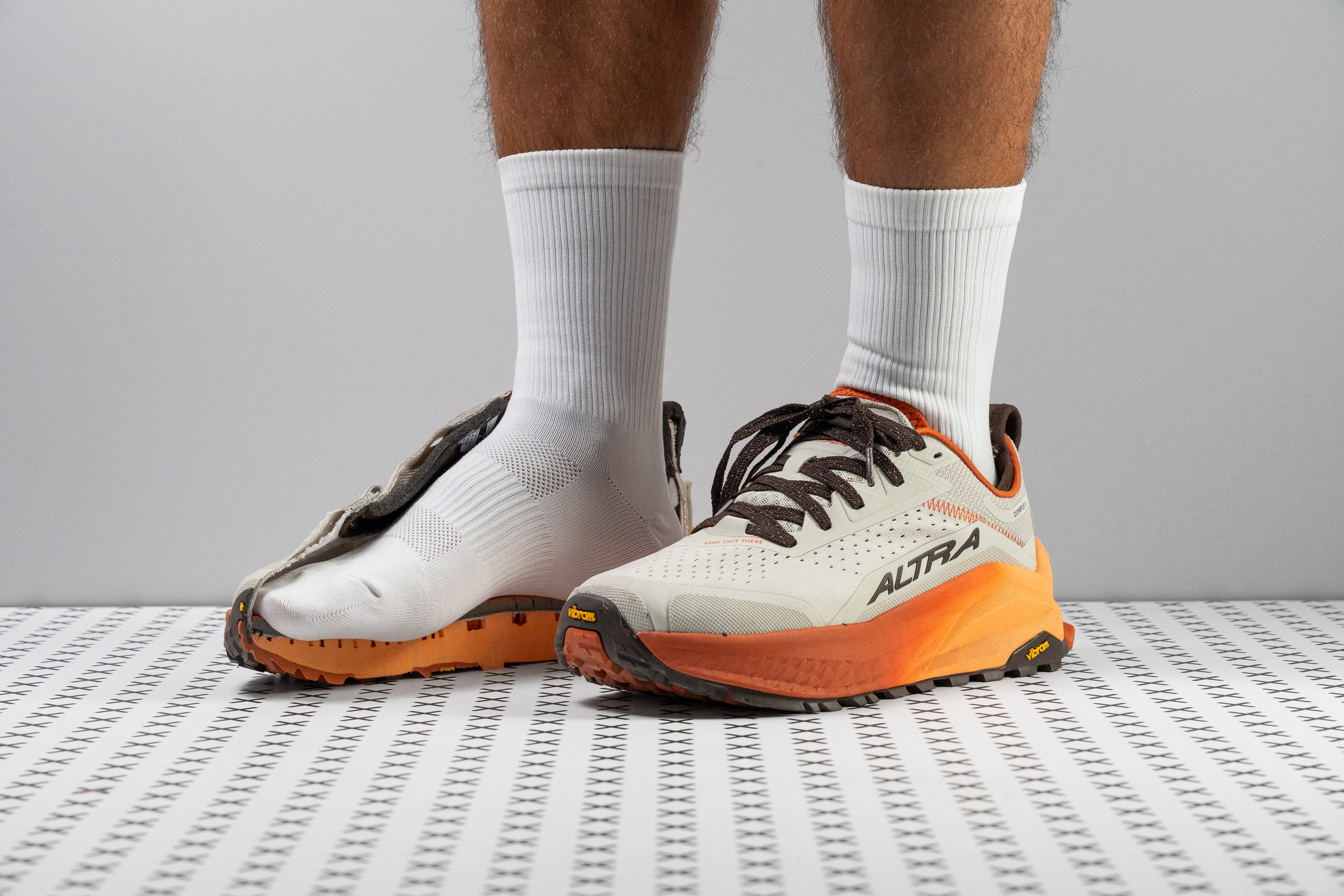


























































What makes it the best?
Staying true to Altra’s core, the Olympus 6 features a genuine zero drop and an anatomically shaped toebox. Lab tests verify its unmatched toe splay, with a well-ventilated yet protective upper that proves the shoe’s high-quality build. Among summer hiking shoes, it’s the best with a wide toebox.
We had no worries about black toenails and unwanted pressure on our pinky toes because the toebox is not as pointy as other pairs. Using our gel mold, we measured the big toe area to be a massive 81.1 mm, 8.7% wider than average, giving room for wide or swollen feet.
Wrapping up the package is a durable and breathable upper. We rarely use these two adjectives to describe one shoe, as these tend to perform inversely. It defies lab standards by earning a perfect 5/5 for both breathability and durability, allowing smoke to escape effortlessly and demonstrating strong resistance to wear.
The forefoot offers tons of cushioning at 31.5 mm, making it among the most protective trail shoes in this area. Paired with a 32.2 mm heel, it boasts a tiny offset of 0.7 mm, enhancing both stability and ground sensitivity. If this set-up feels unnatural for hiking, we recommend finding a shoe with a higher drop.
Pros
- Outstanding durability
- Superior build quality
- Grippy Vibram outsole
- Exceptionally comfortable
- Real 0-mm drop
- Ready for the toughest adventures
- Spacious, foot-shaped toebox
- Premium quality materials
Cons
- Extremely heavy
- Slight price increase
- Lacks energy return
Best lightweight summer hiking shoes
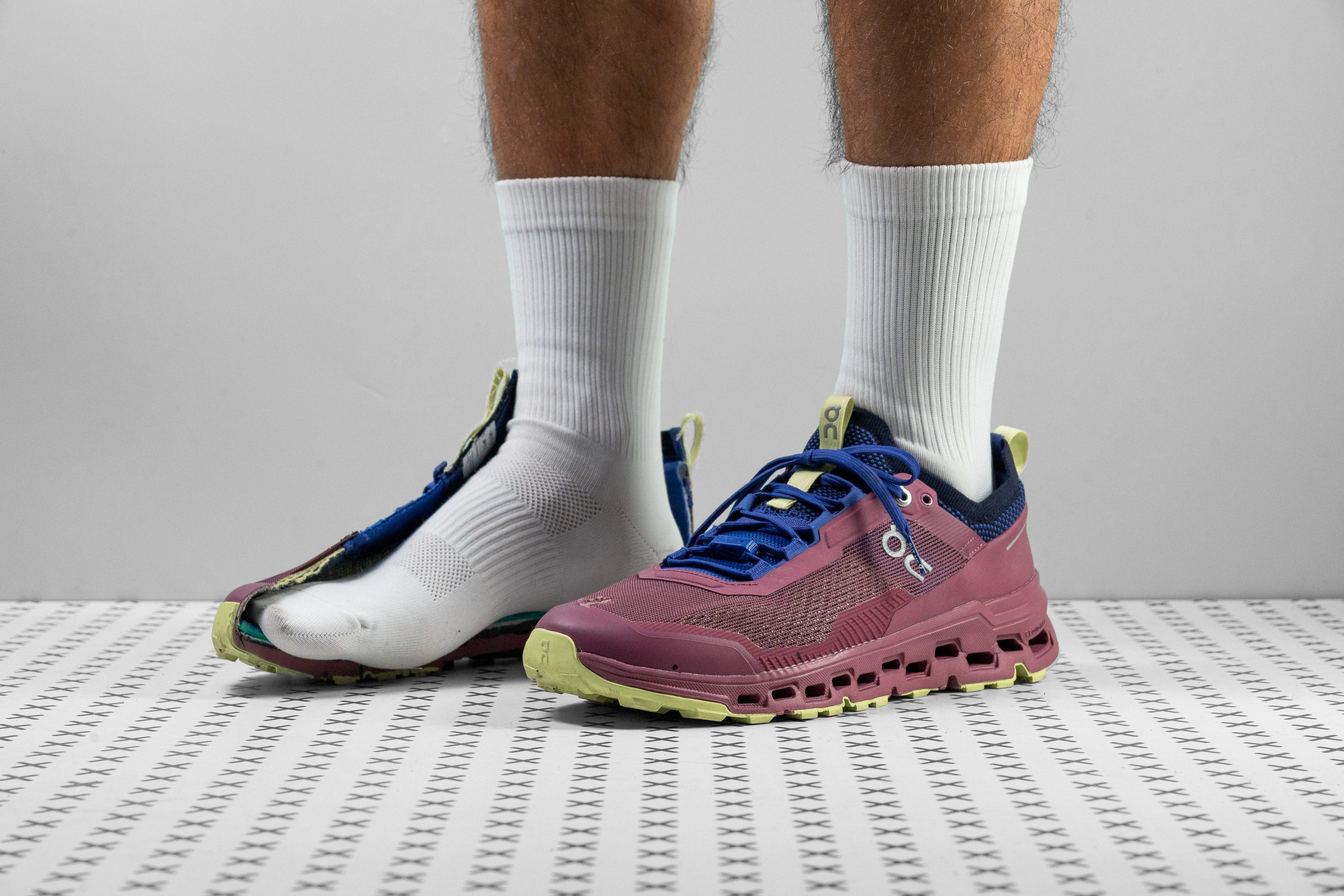


















































What makes it the best?
On Cloudultra 2 won us over with its impact protection, versatility, and indestructible outsole. The comfort it offers allows us to mindlessly gobble the miles, with lab results showing its airy and flexible build. The fact that our legs have no fatigue after long hours on the trail makes it our best lightweight summer hiking shoe.
The Cloudultra 2’s effortless sensation stems from its light and loose build. Our scales show it’s only 10.4 oz (296g), making it 23.9% lighter than the average hiking shoe. Moreover, it’s exceptionally easy to maneuver, with a flexibility score 55.7% above average.
No matter how hot it got outside, our feet could breathe freely. In our smoke test, the air could escape all throughout the upper, earning the maximum 5/5 breathability score. Another layer of comfort is the impact-protective platform, returning a strong 115 SA shock absorption score in the heel.
Underfoot, we found the Missiongrip rubber to be exceptionally wear-resistant and protective from debris. Our Dremel barely affected the shoe with its 0.1 mm wear, proving to be one of the most resilient rubbers we’ve ever tested.
However, the Cloudultra 2 has a steep price of $180, 26.8% more expensive than average. Hikers seeking budget-friendly shoes should check alternatives.
Pros
- Exceptionally breathable
- Long-lasting Missiongrip outsole
- Handy lace tab
- Can handle faster paces if needed
- Versatile for hiking or walking
- Consistently stable ride
- Made with high-quality materials
- Smooth transitions
Cons
- A bit heavy for its use
- Not ideal for winter conditions
- Price might be steep for some
- Low forefoot cushioning
Most comfortable summer hiking shoes
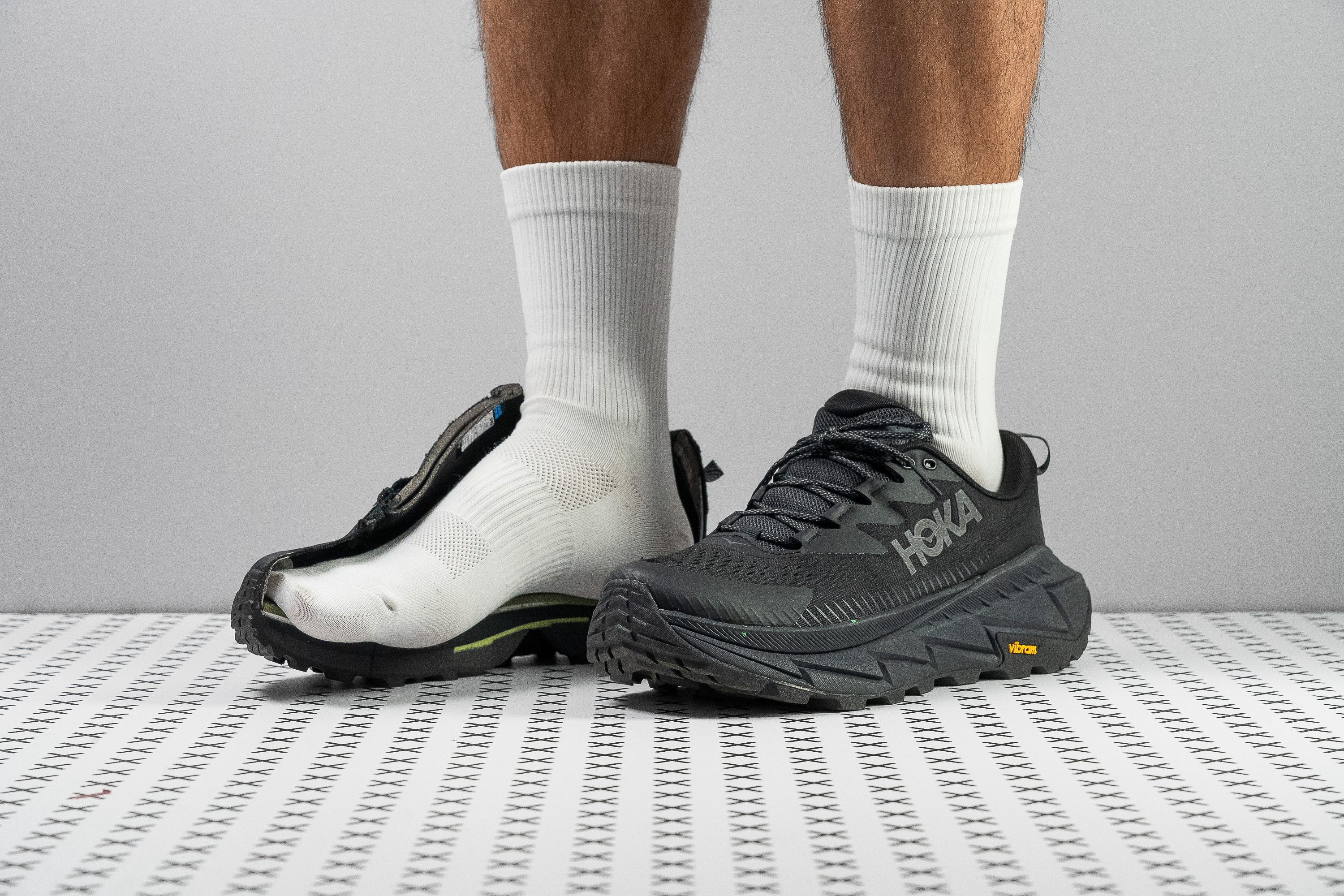















































What makes it the best?
Hoka Skyline-Float X stood out in our lab tests and actual trail adventures, providing not only a breezy experience but a cushioned, stable, and energetic one too. Its maximalist nature delivers heavenly comfort that keeps us chasing the miles even under the scorching heat of the sun, easily winning the comfort game among summer hiking shoes.
The upper embraced us with lots of delicate padding that feels luxurious on foot. Despite this, it offers infinite airflow as it’s dotted with ventilation holes, as confirmed by our lab with a flawless breathability rating.
The midsole offers bottomless cushioning and protection against landing impact. Our caliper reveals a sky-high stack of 39.0/31.0 mm. Surprisingly, the ride feels steady thanks to the supportive Pebax plate, midsole sidewalls, broad landing base, and dual-density foams. Our durometer reveals that the top layer is a plush 22.0 HA, gently compressing underfoot and propelling us forward with liveliness. Meanwhile, the bottom layer, balanced at 27.9 HA, enhances our stability.
Further instilling confidence in our strides is the Vibram outsole’s unmatched traction. The 3.7 mm lugs boasted its adhesive power no matter where we went, from loose ground to wet rocks, and even muddy tracks.
However, the plush nature of the upper absorbs water and drains it out poorly. We recommend staying away from wet conditions in this pair.
Pros
- Extremely well-cushioned
- Devilishly comfortable
- Responsive, rockered midsole
- Works for light trail running
- Excellent multi-terrain traction
- Highly breathable upper
- Feels surprisingly stable
- Performs consistently in the cold
- Made of sustainable and plant-based materials
Cons
- Questionable durability
- Narrow toebox
- Upper dries slowly
Best budget summer hiking shoes overall
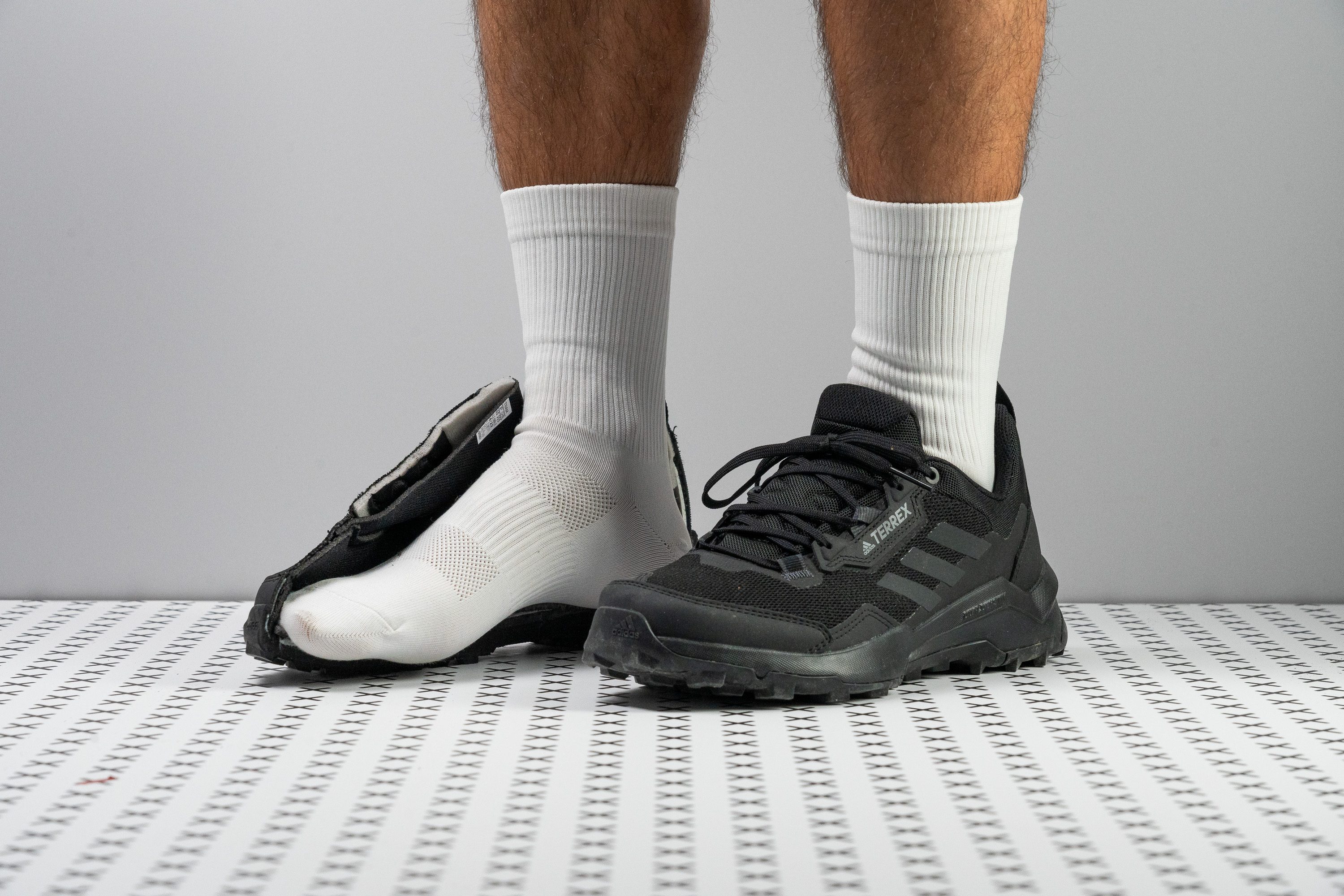






































What makes it the best?
The Adidas Terrex AX4 is a superbly versatile hiking shoe and represents excellent value for money. At 90$, it is $22 cheaper than average for summer hiking shoes. It certainly won’t break the bank, and yet it offers a bunch of features, making it the best value summer hiking shoe. In our lab tests and out on the trail, it shows remarkable breathability, with nice and responsive cushioning and rock-solid stability, making it a great day hiking shoe for the warm summer months.
On our hikes, we found the Terrex AX4 carefully walks the line between breathability and water repellency - quite rare in hiking shoes. In the lab, we pumped smoke into the shoe to gauge its breathability. We rated it 3/5 - right in the middle of the range. Photos taken with our microscope show the tightly-woven fabric upper, whose ventilation pores are small enough to prevent water from dew-soaked grass and light drizzle from seeping into the shoe.
Our feet could breathe on our hikes, keeping them comfortable and blister-free whilst also dealing with light summer showers. Even after a couple of creek crossings, our feet dried out surprisingly quickly, thanks to the breathable upper.
Our feet were well-protected from sharp stones on the trail, so we tested the hardness of the midsole in the lab. Pressing a durometer against the midsole, we found it to measure 39 HA, 19% firmer than average. In practice, we found this firmer midsole supported our feet over longer distances whilst boasting top-notch protection from sharp objects. The cushion even offered a nice bounce to our steps, backed up by its impressive 54.4% rating in our energy return test.
We were impressed by the stability this shoe offered on our hikes and investigated it in the lab. We measured the width of the midsole with a caliper - the forefoot is 1.8 mm wider than average, and at the heel, 1.1 mm wider than average. In our manual tests of the heel counter, we rated it 5/5, the stiffest possible. Every little helps - the stiff heel counter keeps our feet firmly in the shoe, and the wider-than-average platform stops us from rolling our ankles on steep and rocky trails.
We don’t recommend this shoe to hikers looking for a fully waterproof shoe for multi-day hikes or multiple stream crossings.
Pros
- Excellent value for money
- Feels like a trail running shoe
- Breathable
- Water-repellent
- Excellent grip
- Durable for the price
- Stable platform
- Contains recycled materials
Cons
- Lacks toe protection
- Flimsy insole
- Aggressively tapered toebox
Looking for the most breathable shoes is an obvious thing to do. But it’s not enough. Hiking is also very much about proper traction to keep you safe, durability to keep you safe and save you money, and perfect fit. To keep you comfortable and hiking for years to come. This guide will teach you how to find summer shoes that match your criteria.
Breathability lab tests and results
Finding the summer shoe equals finding the breathable shoe. And here’s why you should trust our results. In our lab, we use 3 tests to assess breathability. First, we use a smoke machine to fill the shoe with smoke and watch closely where the smoke comes out and how much of it comes out. Sometimes, it’s just the eyelets (not breathable shoes), other times, it’s all over the place (very breathable shoes).
When doing this test, we assign a rating of 1 to 5 to every shoe, 5 for most breathable. In the example above, it's the breathable shoe on the left, and the non-breathable one (waterproof) on the right.
After that, we check the shoe upper under a microscope. It is so interesting to see how the upper is made, how the fibers are intertwined, and whether there are any vent holes.
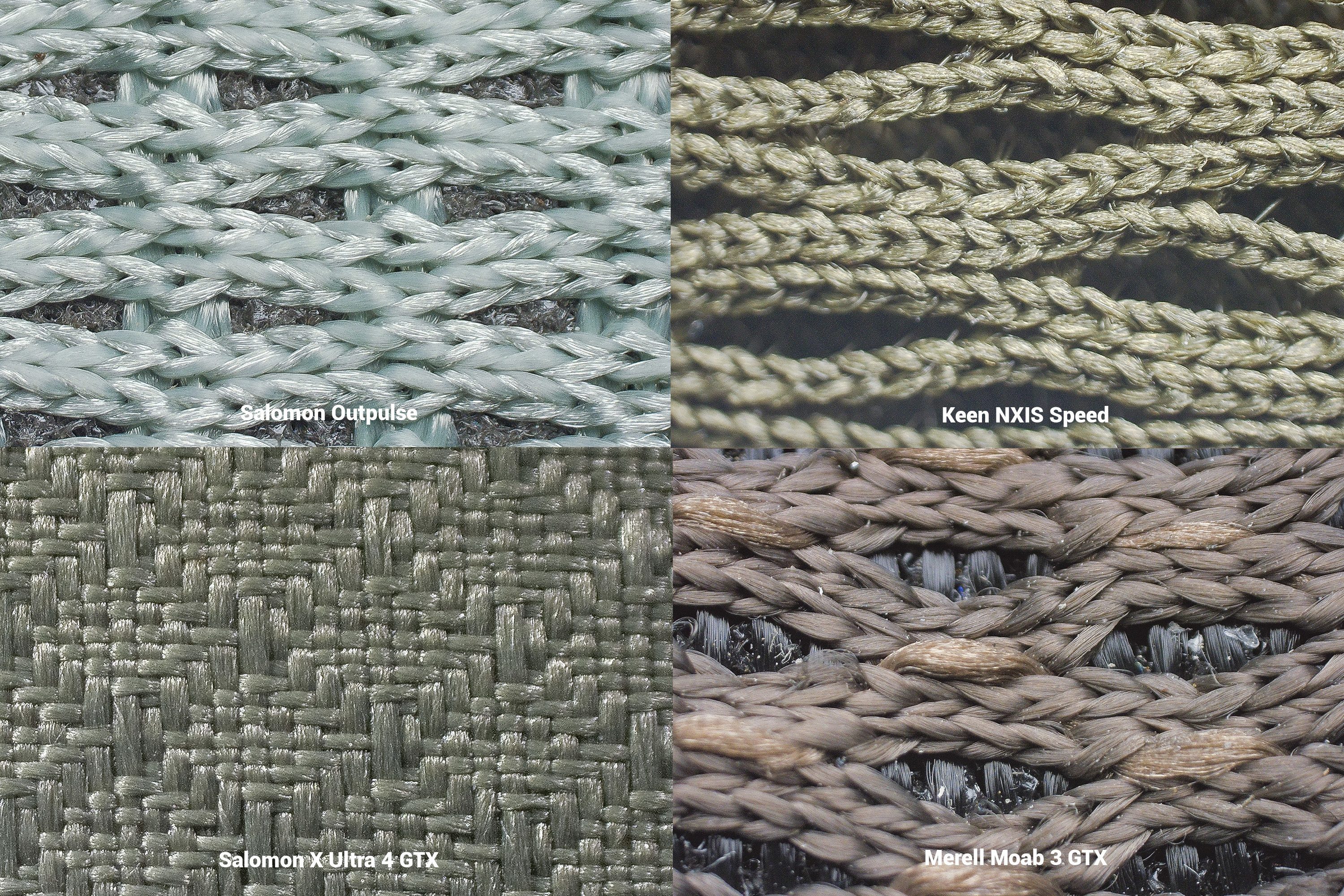
(down) the least breathable uppers (scored 1/5 on our breathability test)
This depends on the technology used and on the material of the upper. Gore-Tex and leather hiking shoes are less breathable, while mesh can be top-of-the-class breathable. Finally, we examine the upper over a flashlight to understand where overlays are and why the smoke did or did not come out where we expected.
The average breathability of hiking boots is 1.4, while the same average for hiking shoes and trail running shoes sits at 2.72 and 3.34, respectively. Because of this, even 3/5 is considered breathable in hiking shoes.
Want a durable and breathable upper?
Just because the upper is super breathable, it doesn’t mean it can be durable as well. Or can it? Let’s see.
In the lab, we use a Dremel and press it against the upper. Then, we visually assess the damage and rate it on a 1-5 scale, where 1 is the least durable.
Here, you can see the most durable uppers in summer hiking shoes. As an extra layer, we added the durability of the outsole and heel counter as well. The heel counter is also assessed on a 1-5 scale, while the durability of the outsole is measured in millimeters: how deep the dent is. The bigger the dent, the less durable the outsole.
Lugs and grip: Best choice for summer hikes
Which tread pattern and lug depth you need depends on the terrain of your hikes. In the lab, we measure the softness of the outsole rubber, the durability of said rubber and the lug depth.
We use an HC shore durometer to test the softness of the rubber, then we press a Dremel against it and measure the dent the Dremel has made and, finally, we use a caliper to measure the depth of the lugs.
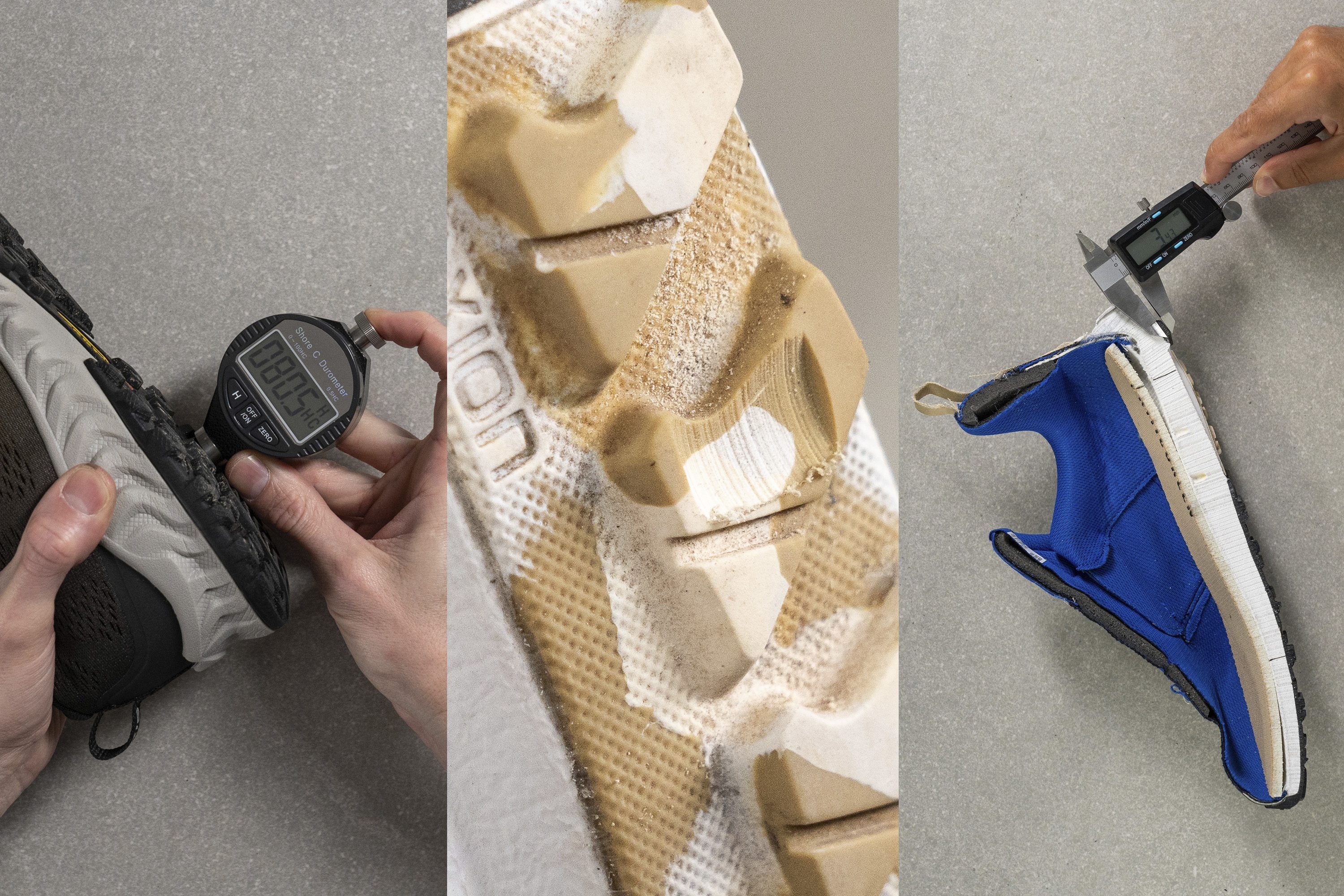
Here are our guidelines:
- Choose deeper lugs (4mm and above) if you plan to hike over mud, slush, or similar loose terrain. Lugs that are further apart one from the other are less prone to collecting mud.
- Choose shallower lugs (up to 4 mm) if you plan to do a bit of everything and nothing too demanding. Most likely no mud, no water hiking, etc. They work great on hard-packed trails.
- Shallower lugs are great as a road-to-trail option when you know you’ll cover concrete or asphalt and not just the trail. This usually applies to well-maintained easy trails.
If you get hiking shoes with huge crampons, keep in mind that they tend to be made of softer rubber. Softer rubber is easier to damage, so you don’t want to wear such shoes on hard surfaces. It’s a perfect recipe for premature wear.
Note: When it comes to outsole hardness, the lower the number, the softer the rubber.
How stable are summer hiking shoes?
Breathable uppers tend to be thin and not covered with overlays. Because of this, we are very curious to find out how stable the shoes are.
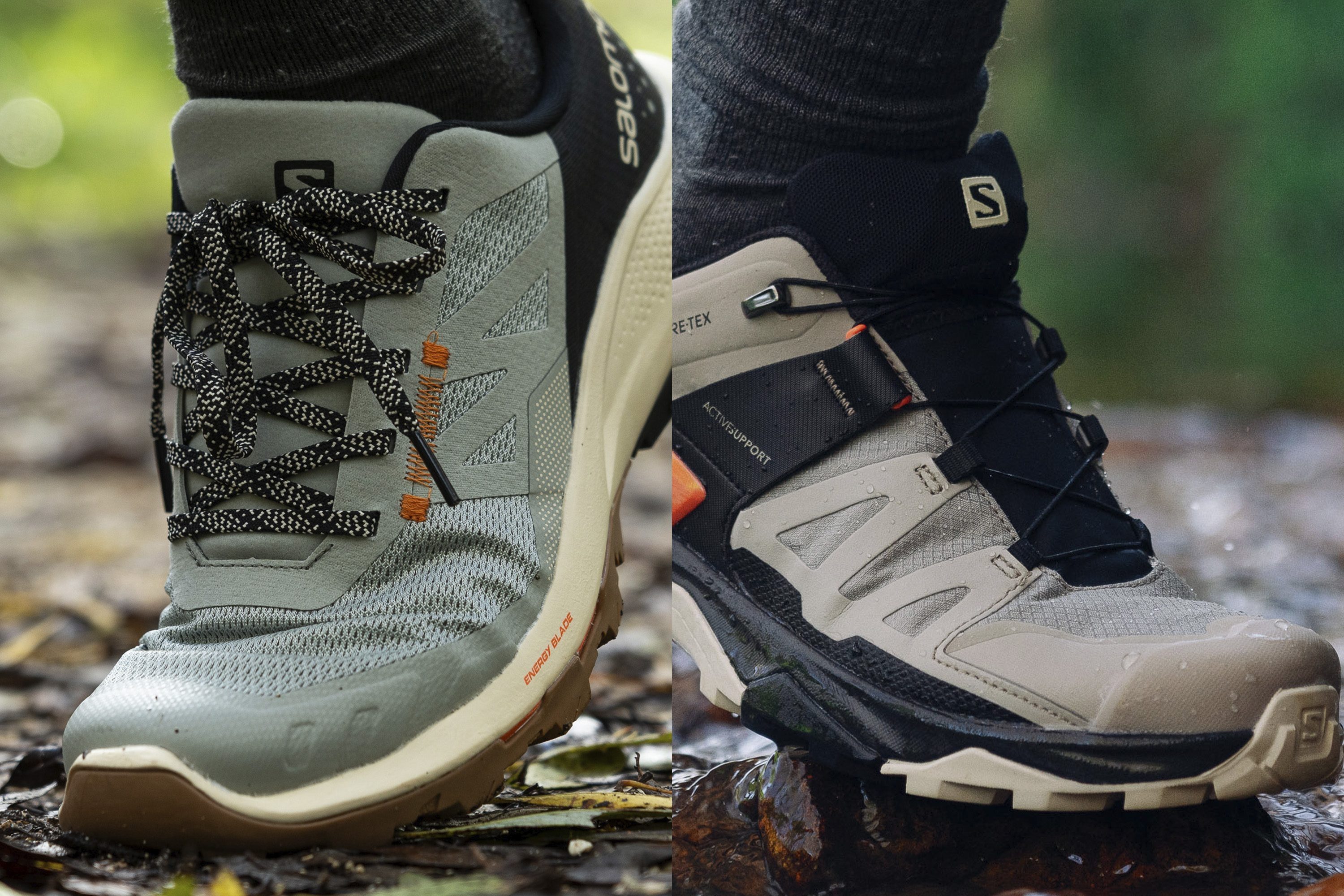
What plays a significant role in stability, next to overlays that make the upper more structured, is the width of the base and the stiffness of the heel counter. In the lab, we measure both.
We use a caliper to measure the width of the base both at the forefoot and at the heel. Stable hiking shoes have a wide base - both in the heel and in the forefoot.
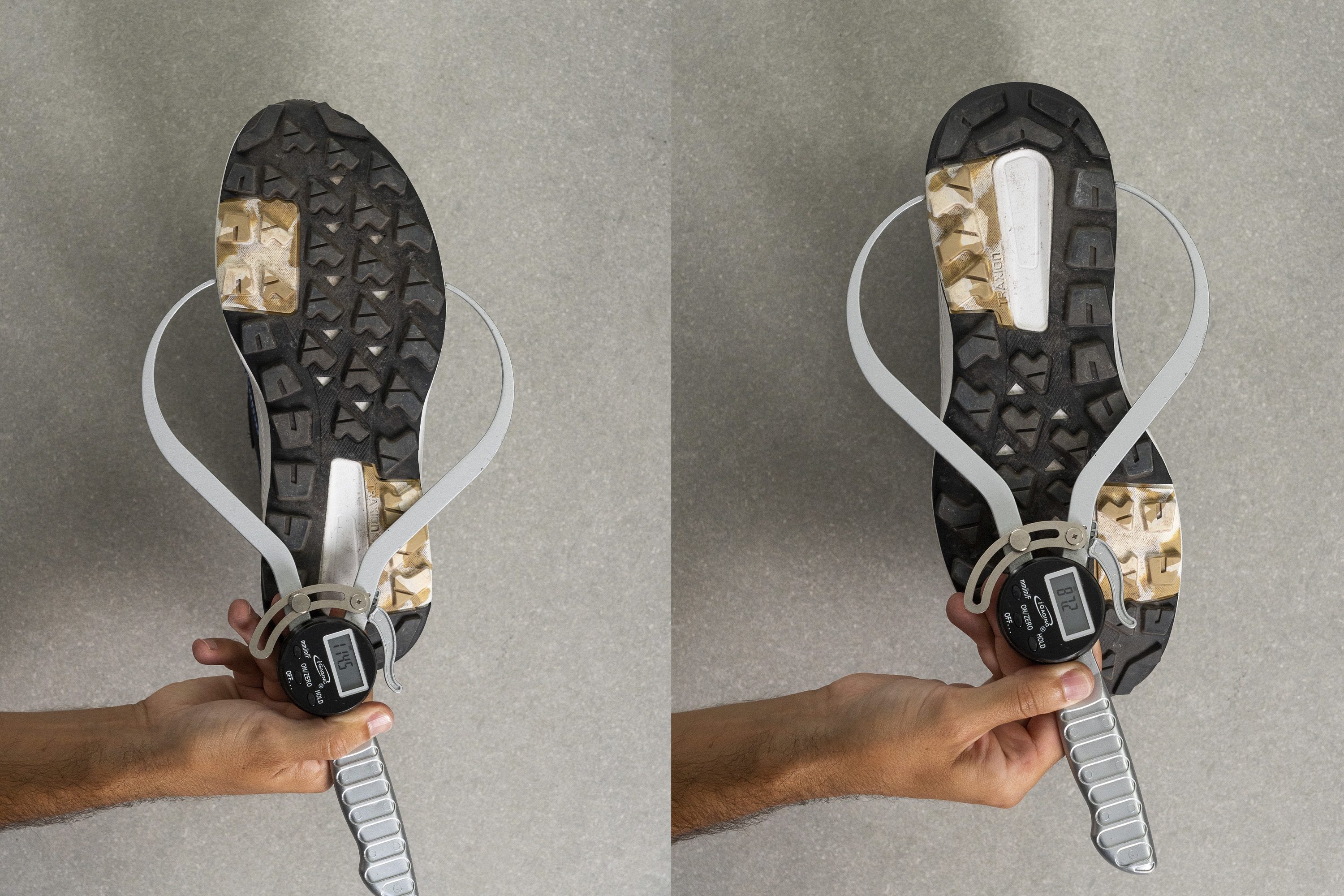
And, we manually squeeze and push the heel counter to assess its stiffness. We give it a rating on a 1-5 scale, where 5 is the stiffest. Stiffer heel counters keep the heel locked down.
Don’t let the shoes weigh you down
Think about this: it’s summer, your hiking shoes are breezy, your socks are not wet from the sweat, and you’re enjoying the hike a lot. But your feet are more tired than usual. You feel the shoes weighing you down.
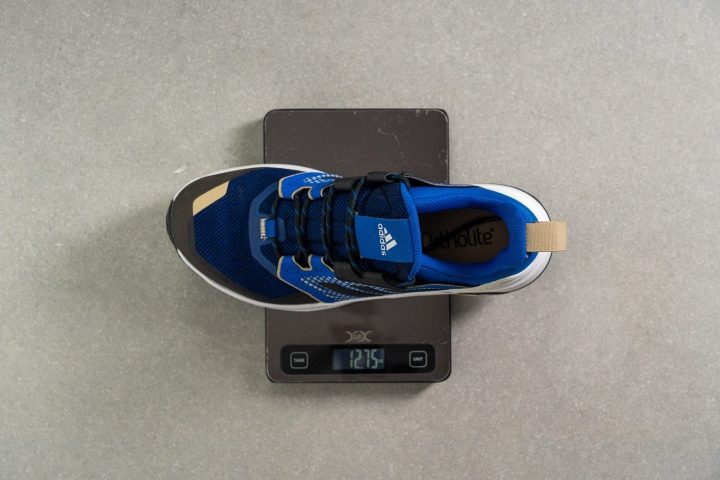
To avoid this, we suggest looking for lightweight summer hiking shoes. We measure every hiking shoe that goes through the lab, and these are the results:
If lightweight hiking shoes are your cup of tea, you might enjoy the nitpicking we covered in this guide: Best lightweight hiking shoes.
Shock absorption of summer hiking shoes
While breathability certainly brings a lot to the table comfort-wise, shock absorption brings more. This is because hiking shoes with very low shock absorption may even hurt hikers' feet or cause very premature foot fatigue.
Lab testing the shock absorption of hiking shoes
When we drop an 8.5kg mass from a 5cm height onto the heel, we actually test the shock attenuation, or how good the midsole is at dampening the impact forces. Whenever we land on the heel, we squish the midsole a bit, and the more it's capable of handling the impact forces, the less stress our legs have to deal with. The higher the shock absorption, the better!
Nail the fit in your summer hiking shoes
The rules for buying summer hiking shoes are the same as the rules that apply to buying basically any other hiking shoe, when it comes to how the shoes fit. Our guidelines:
- Try the shoes in the afternoon or evening. It’s when natural swelling occurs after the workday and it can somewhat imitate what happens on a hike as well.
- Try the shoes with the socks you’re usually wearing when hiking and use the insoles/orthotics if you have them.
- Aim for the perfect fit. Not too tight, definitely not too loose!
- Use the ramp covered with different materials: rocks, artificial grass, etc. Go up and down. Make sure there’s no foot sliding inside the shoes! Hikers prefer having a thumb’s width behind/in front of the foot.
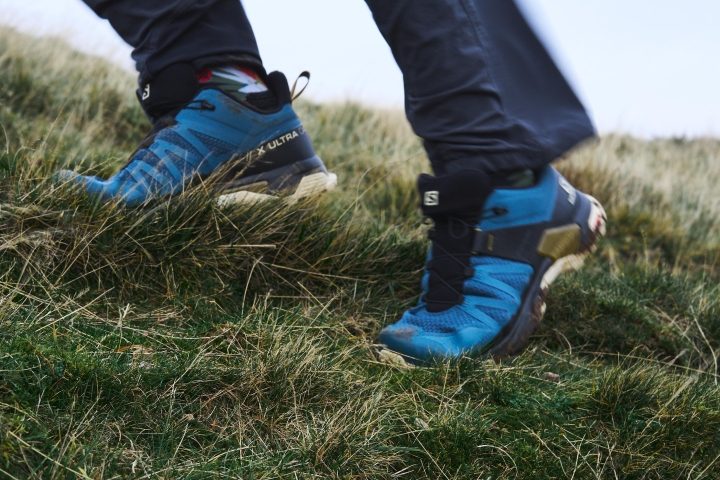
Firm or soft: comfort in summer hiking shoes
The softness of the footbed depends on your personal preference and the type of hike you’re planning. We measure the softness of the midsole in hiking shoes using a Shore A durometer. We press its needle into the midsole and the result is a 0-100 number. The lower the number, the softer the midsole.
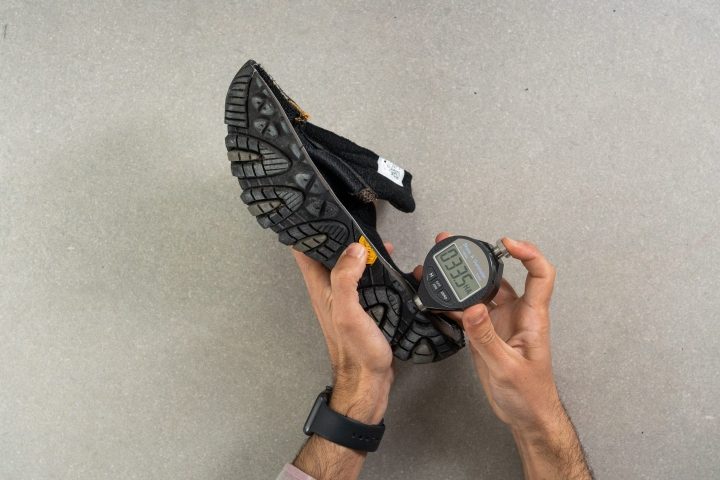
Softer and more flexible hiking shoes are great for shorter hikes, especially when you want to feel the taste of more natural movement.
Firmer hiking shoes are great for hikes when you’re backpacking or simply need more stable shoes to keep you safe on the hike (very uneven terrain, for example).
How can socks help?
Socks play a significant role in hiking. In summer, it’s best to use wool socks, ideally the thin ones, not regular or thick. Wool is great at wicking moisture and preventing odor.
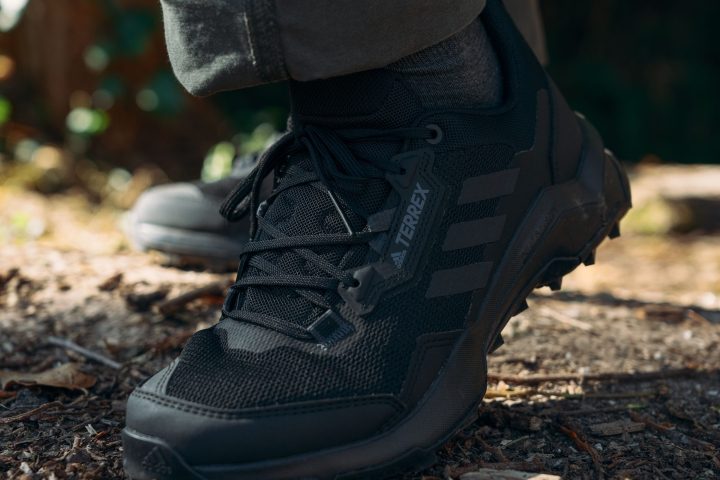
If you have some history of blisters, consider getting compressive socks. They can make your feet feel snugger and more comfortable inside the shoe (plus they could improve circulation). We advise against using cotton. It does not dry out quickly and it retains moisture, making the socks heavy and blister-friendly.
